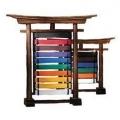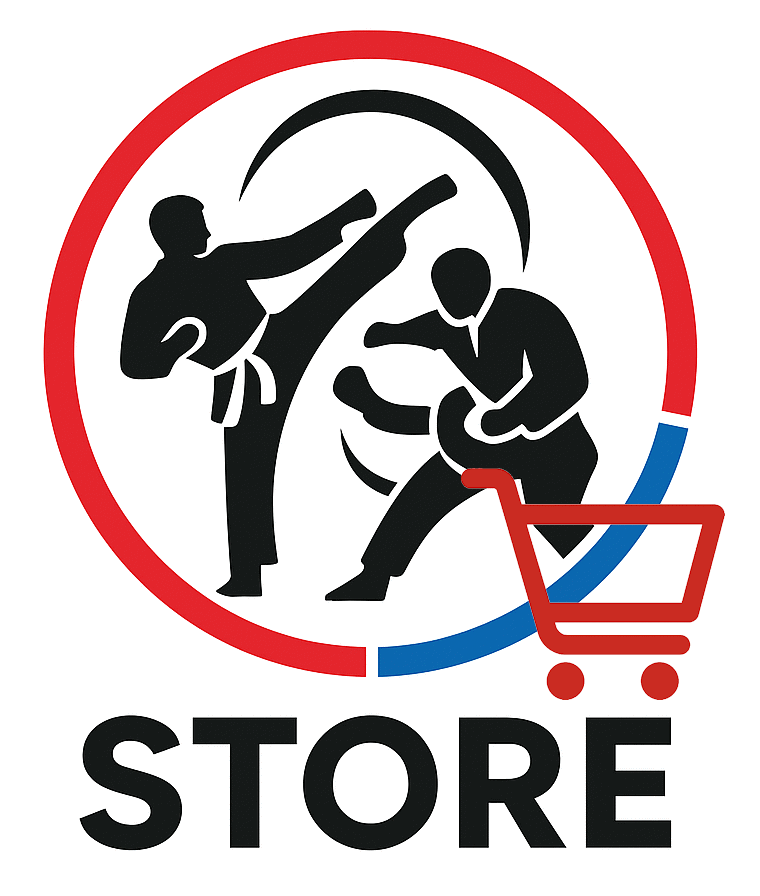Beginner’s Dojo Guide
Welcome! These are the essential rules every new student should know.
1. Courtesy & Respect
-
Bow when entering and leaving the dojo.
-
Greet Sensei with:
-
Start of class: “Onegaishimasu, Sensei” (Please teach me).
-
End of class: “Arigato gozaimasu, Sensei” (Thank you, Sensei).
-
-
Always show respect to Sensei, seniors (Senpai), and fellow students.
-
No loud talking, anger, or disrespect in the dojo.
2. Attendance
-
Arrive 15 minutes early to clean, warm up, and prepare.
-
If late: bow, kneel (seiza), meditate (mokuso), then wait for permission to join.
-
Notify Sensei if you are sick, injured, or must leave early.
-
Do not train if you are contagious.
3. Uniform (Gi)
-
Wear the approved dojo gi with patch on the left chest.
-
Keep gi clean and neat.
-
Girls wear a plain white T-shirt under gi.
-
Belts should not drag on the floor.
-
All uniforms and gear must be purchased exclusively from the official dojo store. Outside uniforms or equipment will not be permitted in class.
👉 silveradokarate.com/store/product-category/karate-gi-uniforms
4. Dojo Etiquette
-
Shoes/slippers neatly arranged outside.
-
No jewelry, gum, food, or drinks (except water).
-
No running, playing, or toys in the dojo.
-
Speak quietly and respectfully.
5. Effort & Training
-
Always try your best — but know your limits.
-
Karate is a marathon, not a sprint. Be patient.
-
Help clean the dojo. Seniors set the example.
6. Safety
-
Keep nails trimmed and hair tied back.
-
Bring water and stay hydrated.
-
Kumite (sparring) only with Sensei’s supervision.
7. Spirit
-
Karate is for self-defense only — never for showing off or starting fights.
-
Remember the three maxims:
-
Karate begins and ends with courtesy.
-
Karate polishes the spirit.
-
There is no first attack in Karate.
-
✅ Follow these simple rules and you’ll quickly feel at home in the dojo. Seniors will guide you along the way.
Advanced Dojo Rules
The Way of the Warrior (Bushidō in Karate)
The dojo is not only a place to train — it is the forge where spirit, body, and mind are tempered.
A true Karateka follows the path of the warrior: discipline, respect, and loyalty.
1. The Spirit of Karate
-
Karate ni sente nashi — There is no first attack in Karate.
-
Use Karate only in defense of life and justice.
-
A true warrior is humble: strength is revealed in restraint, not aggression.
-
The hand that can strike must also know mercy.
2. Courtesy and Honor
-
Karate begins and ends with courtesy.
-
Bow with sincerity — it is the warrior’s greeting and farewell.
-
Respect Sensei, your seniors (Senpai), and your juniors (Kohai).
-
Never forget: arrogance destroys the spirit, humility strengthens it.
3. Loyalty to the Dojo
-
There is only one head instructor (Sensei). Follow his guidance.
-
Do not split your loyalty — one dojo, one path.
-
To train elsewhere, seek Sensei’s permission.
-
When visiting another dojo, carry yourself as an ambassador — with dignity, respect, and honor.
4. Discipline in Training
-
Arrive early; prepare the dojo before training.
-
Clean the dojo as you would polish your sword — with care and pride.
-
Practice with full spirit. Do not waste time.
-
Endure hardship. The way of Karate is a lifetime pursuit.
5. Attitude Toward Learning
-
Keep the heart of a beginner — open, humble, ready to learn.
-
Accept correction with gratitude, never resistance.
-
Teach juniors with patience. Guide them as you were guided.
-
It is better to master one kata deeply than to know many poorly.
6. Kumite – The Way of Combat
-
Kumite is not a contest of ego — it is a lesson in spirit.
-
See your partner not as an opponent, but as a mirror.
-
Remain calm; anger clouds the mind.
-
Strikes must be controlled. Life is precious — do not waste it.
7. Kata – The Soul of Karate
-
Kata is not a performance — it is the living record of battle.
-
Practice with focus, rhythm, and intent as if facing a real enemy.
-
Understand the meaning (bunkai) of every movement.
-
Breathe correctly; let spirit (kiai) flow from within.
8. The Way Beyond the Dojo
-
Carry Karate into your daily life.
-
Live with honor, discipline, and compassion.
-
Protect the weak. Show respect to all.
-
Remember: the greatest victory is to conquer oneself.
9. Loyalty and Brotherhood
-
Be loyal to the dojo, to Sensei, and to your fellow students.
-
Senior students must guide juniors with kindness and strength.
-
The dojo is a family — unity is our strength.
Final Word
Karate is a way of life, not just a skill.
Train with the spirit of the samurai: courtesy, courage, loyalty, honor, and self-control.
"The sword is in your mind, not in your hand."



















